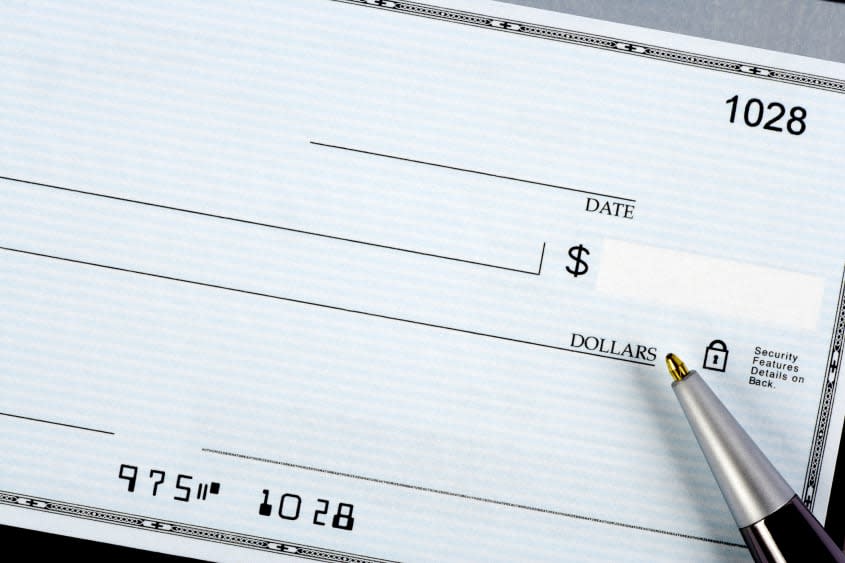The renewed rise of check fraud

Check fraud is not new, and financial plots have been around in the United States for centuries. But what has caused the renewed uptick in check fraud in recent years, and what can be done about it? Here's everything you need to know:
What exactly is check fraud?
Per credit company Experian, check fraud occurs when someone "steals your actual checks or reproduces them," allowing them to then "cash those checks" and pull "money right out of your bank account." There are many different types of check fraud, all of which have evolved over the decades as the technology used by fraudsters has improved.
Check fraud remains one of the most common types of identity theft. It can be very difficult to track an experienced scammer, since "identity thieves will take pains to reduce the chance" of being caught, notes US News & World Report.
Though check fraud can be as basic as someone simply cashing a fake check, there has recently been a rise in an age-old trick: Check washing. Such scams "involve changing the payee names and often the dollar amounts on checks and fraudulently depositing them," the U.S. Postal Inspection Service warns. "Occasionally, these checks are stolen from mailboxes and washed in chemicals to remove the ink," which hypothetically allows a scammer to replace the original check holder's information with anything they want.
This process may be more simplistic than it might seem. Writing for The Conversation, David Maimon, a criminal justice professor and criminology professor at Georgia State University, said criminals can "use nail polish remover to erase the intended payee's name and the amount displayed on the check, replacing those details with their own preferred payee."
Why has there been such an increase in fraud?
A few major factors, including COVID-19, have together contributed to the problem. During the pandemic, trillions of dollars in COVID relief checks were sent out around the country, resulting in untold amounts of financial criminality, CNBC reports. This gave a new boost to check-washing schemes and instances of check fraud as a whole.
However, there is also a less obvious factor at play: Social media. And the spotlight has been placed on one app in particular — Telegram. The controversial instant messaging platform has seen rampant use by criminal syndicates and financial fraudsters, largely because it can be used anonymously and much of the data is encrypted. A real phone number isn't even needed to sign-up — in fact, a new version of the app "allows for account signups using purchasable blockchain-based identities instead of real phone numbers," making it easy for wrongdoers to hide, The Verge reports.
"Check fraud, and perhaps fraud in general flourishes on Telegram mainly due to its unrestrictive nature," Maria Noriega, an analyst at cybersecurity firm Q6 Cyber, told CNBC. Telegram told CNBC in a statement that it monitors its platform for harmful content, and has "banned millions of chats and accounts for violating our Terms of Service," but Q6 was able to find at least 30 channels on Telegram dedicated to tips on committing financial fraud, with one group reportedly having at least 20,000 members.
CNBC cited a number of other issues contributing to rampant check fraud, including security loopholes in the Postal Service, as well as the lack of prosecution for crimes of this type.
How much fraud is there?
It's hard to pinpoint an exact number. However, data from the Financial Crimes Enforcement Network, a division of the Treasury Department, found that banks saw an 84 percent increase in check fraud in 2022 from the year prior. This equates to 460,000 reported fraud cases, compared to just 250,000 in 2021. And while a related monetary figure is hard to come by, it is almost certainly in the multi-billions.
Additionally, it doesn't appear that the rising levels of check fraud are going to go away any time soon, and will likely continue to climb. Frank McKenna, the chief fraud strategist at Point Predictive, told financial website BankInfo Security that "check fraud is going to hit $24 billion or more this year," adding: "You are going to see banks start to implement newer technologies. You are going to see banks start to try to solve the problem of these identity thefts and fake accounts that are getting in bank accounts and depositing these fake checks." McKenna even predicted that some banks may stop issuing checks altogether in an effort to combat fraud. Relatedly, small banks seem to be "bearing the brunt" of fraud losses, per a report in American Banker, though it is nonetheless a problem for banks of all sizes.
What can be done?
According to experts, much of the onus appears to be on consumers themselves, seeing as check fraud is, of course, already illegal.
Frank Abagnale, an infamous con whose elusive story of fraud was the basis for Steven Spielberg's 2002 film Catch Me If You Can, shared with US News & World Report a few basic tips to protect oneself from bad checks. One way, he said, was simple: Don't use checks.
Despite the fact that he'd made a lot of money designing checks, Abagnale said that he "personally write[s] very few checks." This is because every check he leaves with a clerk has his "name, address, phone number, my bank's name and address, my bank account number, routing number, and my signature." There is really no good way, he said, to ensure that information is disposed of once the check is processed.
However, for check users that do, unfortunately, fall victim to fraud, Credit Karma recommends trying to stop the payment, reporting the suspected fraud to the bank, and filing alerts with credit reporters, among other guidance.
You may also like
Americans applying for controversial 'golden passports' more than any other nationality, report says

